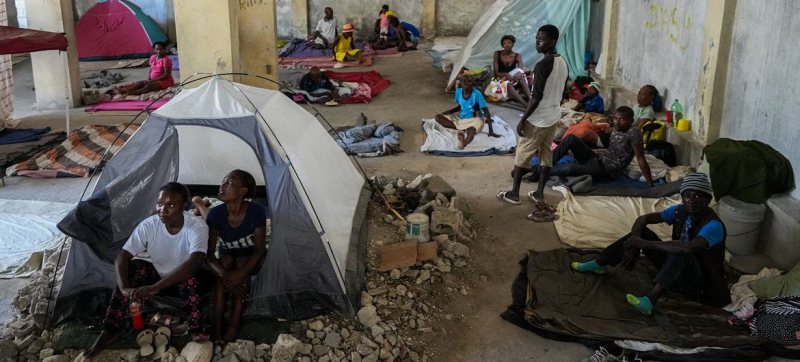- US Faces Pressure as UN Votes on Gaza Ceasefire |
- Prof Yunus includes 4 political leaders in UNGA tour del |
- Tarique calls for vigilance to prevent troubles during Puja |
- Parties divided on constitution order move over July Charter |
- Khulna’s ‘white gold’ shrimp eyes Tk 22,600cr export goal |
‘Tomorrow is Too Late’: Haiti’s Humanitarian Crisis Deepens

In Port-au-Prince, the capital of Haiti, escalating violence has become a grim reality that is displacing thousands.
As gang violence across Haiti escalates and the United States along with other donors reduce their humanitarian funding, 1.3 million displaced people face the direst of consequences.
Women and girls bear the brunt of this crisis. Gender-based violence (GBV), including gang rape, is rampant—particularly in the capital, Port-au-Prince—and is worsened by precarious conditions in displacement camps.
Recent funding cuts have forced the closure of centres providing sexual and reproductive health services, including GBV support. For the limited services that remain, insecurity and displacement make access extremely difficult.
Christian Vovi, the UN reproductive health agency’s (UNFPA) Humanitarian Coordinator in Haiti, who has been working in the country since 2022, spoke with UN News ahead of World Humanitarian Day to share his perspective.
“Sometimes there is the possibility of an attack, so we are obliged to work from home. This situation limits our ability to visit affected communities, meet women, and observe the situation in camps. Security is a constant barrier. We can only organise virtual meetings and monitor activities remotely.”
Continued displacement has created new GBV needs that humanitarian actors struggle to meet with limited funding. Reported cases of GBV are rising steadily.
“In some cases, gang members burn houses and then rape parents in front of their families,” said Vovi. “When you speak with women, they are desperate, struggling to secure even basic necessities. With no access to financial resources, many are forced into prostitution.”
Protection services remain scarce. Of more than 100 displacement sites, only 11 or 12 are covered by GBV protection programmes. Overcrowded shelters also increase the risk of abuse.
UNFPA distributes dignity kits and other goods, but supplies are insufficient. With over one million displaced people—26 per cent of whom are women of reproductive age—millions of dollars are urgently needed.
In 2020, the US provided around 65 per cent of humanitarian funding for Haiti’s response plan. But with recent US funding cuts, services can no longer be provided to 25,000 women and girls in some sites. Stocks of post-rape kits, previously fully funded by the US, are now running dangerously low.
Despite the challenges, UNFPA continues to lead the GBV coordination mechanism and operates a hotline to provide psychosocial support and access to services when movement is restricted.
The international community must urgently address the funding gap in Haiti’s humanitarian response.
“Haitians feel their situation is neglected,” Vovi said. “They believe the global humanitarian community has the resources to end the violence and assist them. It is crucial to act now because, for me, tomorrow is too late.”

